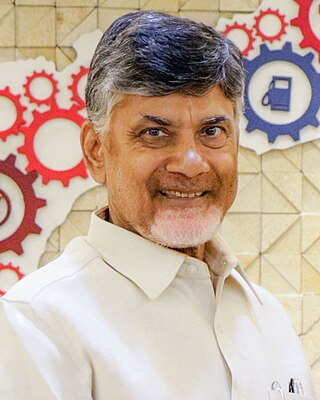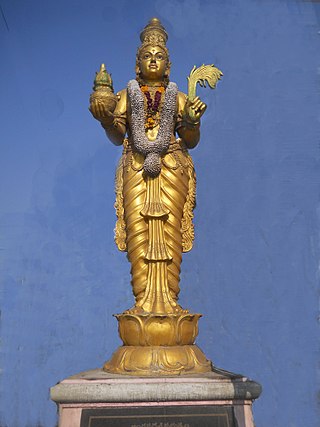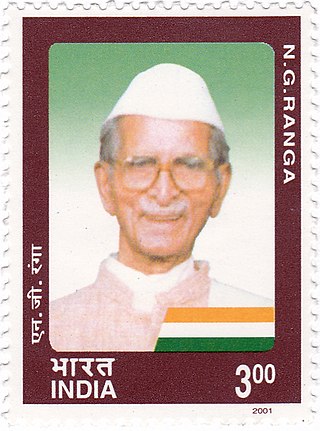
Andhra Pradesh is a state in the southern coastal region of India. It is the seventh-largest state with an area of 162,970 km2 (62,920 sq mi) and the tenth-most populous state with 49,577,103 inhabitants. It has shared borders with Chhattisgarh, Odisha, Karnataka, Tamil Nadu, Telangana and the Bay of Bengal. It has the second-longest coastline in India at about 974 km (605 mi). After existence as Andhra State and unified Andhra Pradesh, the state took its present form on 2 June 2014, when the new state of Telangana was formed through bifurcation. Amaravati is the capital of the state, with the largest city being Visakhapatnam. Water sharing disputes and asset division with Telangana are not yet resolved. Telugu, one of the classical languages of India used by the majority of people, is the first official language.

Telugu is a Dravidian language native to the Indian states of Andhra Pradesh and Telangana, where it is also the official language. Spoken by about 96 million people (2022), Telugu is the most widely spoken member of the Dravidian language family, and one of the twenty-two scheduled languages of the Republic of India. It is one of the few languages that has primary official status in more than one Indian state, alongside Hindi and Bengali. Telugu is one of the six languages designated as a classical language by the Government of India. It is the 14th most spoken native language in the world. Modern Standard Telugu is based on the dialect of erstwhile Krishna, Guntur, East and West Godavari districts of Coastal Andhra.

Nandamuri Taraka Rama Rao, often referred to by his initials NTR, was an Indian actor, filmmaker and politician who served as Chief Minister of Andhra Pradesh for seven years over three terms. He starred in over 300 films, predominantly in Telugu cinema, and was referred by the media as Viswa Vikhyatha Nata Sarvabhouma. Rao received three National Film Awards for co-producing Thodu Dongalu (1954) and Seetharama Kalyanam (1960) under National Art Theater, Madras, and for directing Varakatnam (1970). Known for his breakthrough performances in Raju Peda (1954) and Lava Kusa (1963), Rao garnered the Nandi Award for Best Actor for Kodalu Diddina Kapuram in 1970, and the Inaugural Filmfare Award for Best Actor – Telugu in 1972 for Badi Panthulu.
Kamma is a Hindu caste from South India. The community of Kammas is believed to have originated from agriculturists of the Kammanadu region of the erstwhile Guntur district and Ongole division in Andhra Pradesh. Propelled by their military activity in the Vijayanagara Empire, Kammas are believed to have spread out from the region during the Vijayanagara period, followed by some in-migration during the British period and out-migration again during the twentieth century. Today they are regarded as the richest group in Andhra Pradesh and are a dominant caste from Coastal Andhra with socio-economic and political prominence throughout the Telugu-speaking regions of India.

Visakhapatnam, also known as Vizag, Viśākha or Waltair, is the largest and most populous metropolitan city in the Indian state of Andhra Pradesh. It is between the Eastern Ghats and the coast of the Bay of Bengal. It is the second largest city on the east coast of India after Chennai, and the fourth-largest in South India. It is one of the four smart cities of Andhra Pradesh selected under the Smart Cities Mission and is the headquarters of Visakhapatnam district. With an estimated output of $43.5 billion, it is the ninth-largest contributor to India's gross domestic product as of 2016.

Nara Chandrababu Naidu, also known as Chandrababu Naidu or CBN, is an Indian politician and the current leader of opposition in the Andhra Pradesh Legislative Assembly. He also served as Chief Minister from 1995 to 2004 and as opposition leader from 2004 to 2014 of Andhra Pradesh. He has been the president of the Telugu Desam Party (TDP) since 1995.

Shankar Dayal Sharma was an Indian lawyer and politician from the state of Madhya Pradesh who served as the ninth president of India, from 1992 to 1997.

Neelam Sanjiva Reddy was an Indian politician who served as the sixth president of India, serving from 1977 to 1982. Beginning a long political career with the Indian National Congress Party in the independence movement, he went on to hold several key offices in independent India — as Deputy Chief minister of Andhra state and the first chief minister of Andhra Pradesh, a two-time Speaker of the Lok Sabha and a Union Minister— before becoming the Indian president.

Machilipatnam, also known as Masulipatnam and Bandar, is a city in Krishna district of the Indian state of Andhra Pradesh. It is a municipal corporation and the administrative headquarters of Krishna district. It is also the mandal headquarters of Machilipatnam mandal in Machilipatnam revenue division of the district. The ancient port town served as the settlement of European traders from the 16th century, and it was a major trading port for the Portuguese, British, Dutch and French in the 17th century.

The Satavahanas, also referred to as the Andhras in the Puranas, were an ancient Indian dynasty based in the Deccan region. Most modern scholars believe that the Satavahana rule began in the late second century BCE and lasted until the early third century CE, although some assign the beginning of their rule to as early as the 3rd century BCE based on the Puranas, but uncorroborated by archaeological evidence. The Satavahana kingdom mainly comprised the present-day Andhra Pradesh, Telangana, and Maharashtra. At different times, their rule extended to parts of modern Gujarat, Madhya Pradesh, and Karnataka. The dynasty had different capital cities at different times, including Pratishthana (Paithan) and Amaravati (Dharanikota).

Chakwal District is in Pothohar Plateau of Punjab, Pakistan. It is located in the north of the Punjab province, Chakwal district is bordered by Talagang to its south, Rawalpindi to its north east, Jhelum to its east, Talagang The district was created out of parts of Jhelum and Attock in 1985.

Telugu people, also called Andhras, are an ethno-linguistic group who speak the Telugu language and are native to the Indian states of Andhra Pradesh, Telangana and Yanam district of Puducherry. They are the most populous of the four major Dravidian groups. Telugu is the fourth most spoken language in India and the 14th most spoken native language in the world. A significant number of Telugus also reside in the Indian states of Karnataka, Tamil Nadu, Orissa, Maharashtra. Members of the Telugu diaspora are spread across countries like United States, Australia, Malaysia, Mauritius, UAE, and others. Telugu is the fastest-growing language in the United States. It is also a protected language in South Africa.

Acharya Gogineni Ranga Nayukulu, also known as N. G. Ranga, was an Indian freedom fighter, classical liberal, parliamentarian and farmers' leader. He was the founding president of the Swatantra Party, and an exponent of the peasant philosophy. He received the Padma Vibhushan award for his contributions to the Peasant Movement. N.G. Ranga served in the Indian Parliament for six decades, from 1930 to 1991.

Xavier Institute of Social Service (XISS) (Hindi: जेवियर समाज सेवा संस्थान (एक्सआईएसएस)) is a Jesuit-run business school in Ranchi, India. It was established as an extension department of St. Xavier's College, Ranchi, in 1955 by Michael A. Windey with the objective of training young men and women in Rural Development, Personnel Management and Industrial Relations.
Satya Atluri was an Indian American engineer, educator, researcher and scientist in aerospace engineering, mechanical engineering and computational sciences, who was a Distinguished Professor Emeritus of Aerospace Engineering at the University of California, Irvine. Since 1966, he made fundamental contributions to the development of finite element methods, boundary element methods, Meshless Local Petrov-Galerkin (MLPG) methods, Fragile Points Methods (FPM), Local Variational Iteration Methods, for general problems of engineering, solid mechanics, fluid dynamics, heat transfer, flexoelectricity, ferromagnetics, gradient and nonlocal theories, nonlinear dynamics, shell theories, micromechanics of materials, structural integrity and damage tolerance, Orbital mechanics, Astrodynamics, digital Twins of Aerospace Systems, etc.

Nandamuri Taraka Rama Rao served as Chief Minister of United Andhra Pradesh for three terms, between 1983 and 1995. He was the first person to hold the office while not a member of the Indian National Congress, while representing the Telugu Desam Party (TDP), which he himself founded in 1982. Rama Rao's time in office saw his ousting in an August 1984 coup after 1½ years in office, while he was abroad in the US undergoing coronary heart surgery. He was removed by Thakur Ram Lal, the Governor of Andhra Pradesh, and replaced with Nadendla Bhaskara Rao, the finance minister. Having come back from surgery, Rama Rao regained his position through demonstrating his majority support from members of the Indian Legislative Assembly. He returned to office in September 1984.

Pamulaparthi Venkata Narasimha Rao, popularly known as P. V. Narasimha Rao, was an Indian lawyer, statesman and politician who served as the 9th prime minister of India from 1991 to 1996. He is known for introducing various liberal reforms to India's economy.
Karanam or Karnam was an office and title native to the Indian states of Andhra Pradesh and Telangana. Traditionally, Karanam was an official who maintained the accounts and records of the villages and collected the taxes. Karanam was one of the two village-level administrative posts that existed in Andhra along with 'Munasabu' (Munsiff). The Karanam kept an elaborate system of village accounts.

Amaravati is the capital of the Indian state of Andhra Pradesh. It is located on the right bank of the river Krishna in Guntur district.
Ravipudi Venkatadri was an Indian activist in the rationalist and humanist movements.

















